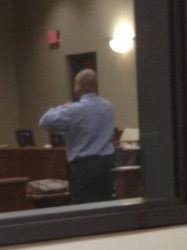Trott Law Litigator Kevin Hammons Spent 19 Years Trying To Weasel Out Of Paying A $7,050 Student Loan
Kevin Hammons is one of best-known as Top Gun litigators for Detroit-based Trott Law. He is known around Michigan as a take-no-prisoners type foreclosure mill attorney. Hammons is also known for his refusal to work deals or offer loan modifications to homeowners.
This is a much different attitude than he had during is pre-Trott Law days. Hammons abused the judicial system for 20 years to avoid paying $7,050.00 in student loans. Ironic, since Hammons is a proponent of kicking people out of their homes as quickly as possible by any means necessary.
Hammons Was Once A Deadbeat Who Abused The Legal System

Hammons borrowed $7,050 in student loans from the Detroit Teachers Federal Credit Union from October 1974 to October 1977. The Credit Union loans were to pay for law school and insured by the U.S. Department of Education.
The Trott Law Top Gun defaulted on the loans when the loans came due. The DTFCU filed a claim with the Department of Education for payment and assigned all its rights to the United States Government.
Hammons was then sued by the U.S. Government on April 25, 1985, to recover losses on the loan. A consent judgment was entered against him in the United States District Court on August 5, 1985. Hammons now faced a judgment of $4,867 plus accrued interest. A post-judgment interest then accrued pursuant to federal law.
The Law firm of Holzman and Holzman was given the case in December of 1989 after Hammons didn’t make payments. Holzman and Holzman contacted Hammons in order to avoid more litigation. The future Top Gun lawyer indicated that he was working as a substitute teacher and earning only minimal amounts of money. Holzman and Holzman agreed to accept payments of $50 per month based on what Hammons told them.
Hammons Gets Busted Misleading The U.S. Government About His Income
Holzman and Holzman obtained a credit report on the Trott Law lawyer in the Spring of 1995. The review indicated that Hammons had leased a new Jeep. Holzman and Holzman then subpoenaed a copy of the credit application Hammons submitted to lease the Jeep.
The application indicated that Hammons was a self-employed attorney earning $5,500 per month. Hammons had indicated on the application he had an account at DTFCU. The DTFCU auto loan application also disclosed the price of the vehicle was $28,000 and indicated that Hammons’s monthly payments were $411.07. Hammons was advised by Holzman and Holzman that they expected payments of $300 per month beginning August 1, 1995.
The Federal Court Garnishes Hammons’ Paychecks And Bank Accounts

Hammons also refused to divulge any financial information to Holzman and Holzman and refused to pay $300 per month. The future Trott Law Top Gun submitted a payment for only $50 in August. As a result, the court issued two writs of garnishment.
The first was directed to Wayne County and the second to Detroit Teachers Credit Union. Detroit Teachers Credit Union filed a disclosure indicating that Hammons had $9,757.87 on deposit and Wayne County sent a check for $2,173 to Holzman and Holzman.
As a result, Hammons filed a motion to dissolve the writs of garnishment. The motion was heard on October 3, 1995. The court dissolved the writ of garnishment against Wayne County because the garnishment against DTFCU fully satisfied the claim of the United States. The court, however, refused to dissolve the writ of garnishment against DTFCU.
Holzman and Holzman had discovered Hammons had over $50,000 in deposits at the DTFCU during litigation.
Hammons Files Frivolous Appeal With 6th Circuit OF Appeals
Hammons appealed his case to the 6th Circuit Court of appeals and attempted to raise five grounds for overturning the district court’s order denying his motion to dissolve the writ of garnishment.
The Trott Law Lawyer attempted to argue that the writ should have been dissolved because he was never served with a copy of the writ or given an opportunity for a hearing prior to the writ being issued. This is a requirement under 28 U.S.C. §§3101(a) (2) and 3101(a) (3).
Hammons then attempted to argue the writ was defective because the United States failed to comply with the requirement under 28 U.S.C. § 3205(b) (5)”.
The Trott Law Lawyer then attempted to argue that the writ was defective because the United States failed to serve Hammons a copy of the writ and failed to certify to the court that it had done so. This is required under 28 U.S.C. §3105.
Hammons then attempted to argue that only the judge and not the court’s clerk was required to issue the writ. This would then nullify the writ.
The 6th Circuit Court of Appeals rejected Hammons’s claims were baseless and without merit.



